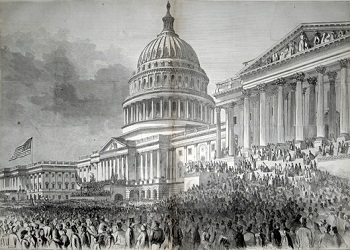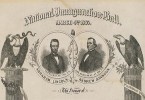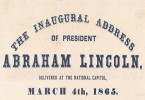President Lincoln’s second inaugural address at the Capitol.
Reconstruction was part of the contest for the next presidential elections. Lincoln was reelected on the belief that he should better finish the difficult job he had already started and that he was the best person to reestablish the national honor.
National Union Party
His reelection campaign rested on War Democrats who joined Republicans forming the National Union Party. Public appearances promoting his reelection were rare, he did not attend rallies or gave speeches but he was involved in the management of his campaign behind the scenes.
President Lincoln was unanimously reelected as Republican (National Union Party) presidential candidate in the Baltimore Convention that met on June 7-8, 1865. Andrew Johnson was nominated as Lincoln’s running mate. The party’s platform called for complete abolition of slavery.
Radical Democracy Party
Radical Republican dissidents formed the Radical Democracy Party and nominated John Fremont as presidential candidate. Recognizing his low chance of winning, Fremont withdrew on September 22 and endorsed Lincoln’s candidacy.
Democratic Party
The Democrats were divided between War Democrats and Peace Democrats. They nominated George B. McClellan as presidential nominee and George H. Pendleton as Vice-Presidential nominee.
Confederates
Confederates sympathizers of the North viewed Lincoln’s reelection as a step back and hoped he would be defeated. In order to prevent his reelection Confederate agents sent emissaries to Canada to try to work a peace agreement. Lincoln sent his envoys with the clear mission to let know his condition was a full repeal of slavery in the South and then he could start negotiating a peace agreement. His condition was rejected. Confederate agents had also planned uprisings in Chicago during the Republican convention and violent demonstrations in major cities during election day.
Supporters
Many Americans supported Lincoln’s reelection and supported the Union cause even thought the war was bloody, lasting longer than anticipated and leading the country to excessive debt.
African Americans were not allowed to vote in the elections but most, if not all, supported the president’s reelection. Abolitionists who were critical of his policies now favored him over Democrat candidate George B. McClellan. Frederick Douglass, Sojourner Truth, and white abolitionist William Lloyd Garrison commanded great leadership and influence on his reelection. Garrison controlled the Liberator and the Antislavery Standard, the two most influential anti-slavery publications.
The president also received strong support from Protestant groups. Intellectuals in the North East viewed Lincoln as the best choice. Harriet Beech Stowe, Ralph Waldo Emerson, Henry Wadsworth Longfellow and James Russell Lowell, among others, endorsed Lincoln’s reelection. Soldiers were overwhelmingly Republican.
Elections
The election took place on November 8th, 1864. Only 25 states participated in the election including the newly formed states of Kansas, West Virginia and Nevada.
Abraham Lincoln won the elections with 212 of the electoral votes and 55% of the popular vote. Democrat George McClellan received 21 electoral votes and won in the states of Kentucky, Delaware and his home state of New Jersey.
Lincoln became the second president to be reelected since Andrew Jackson in 1832.
Northern voters overwhelmingly voted for Lincoln. By re-electing him, the country supported his war policy of no negotiation with the Confederacy. Five months after his re-election the Confederacy had collapsed.



